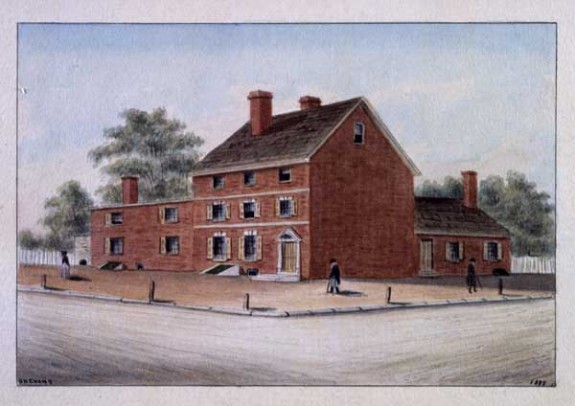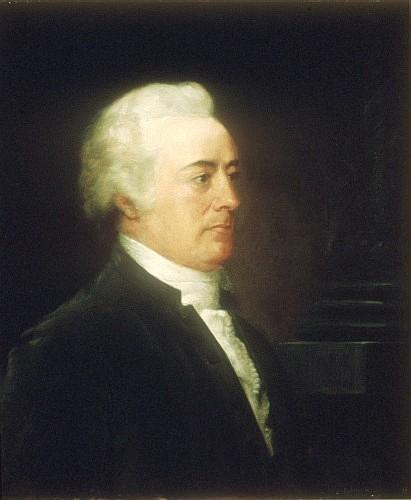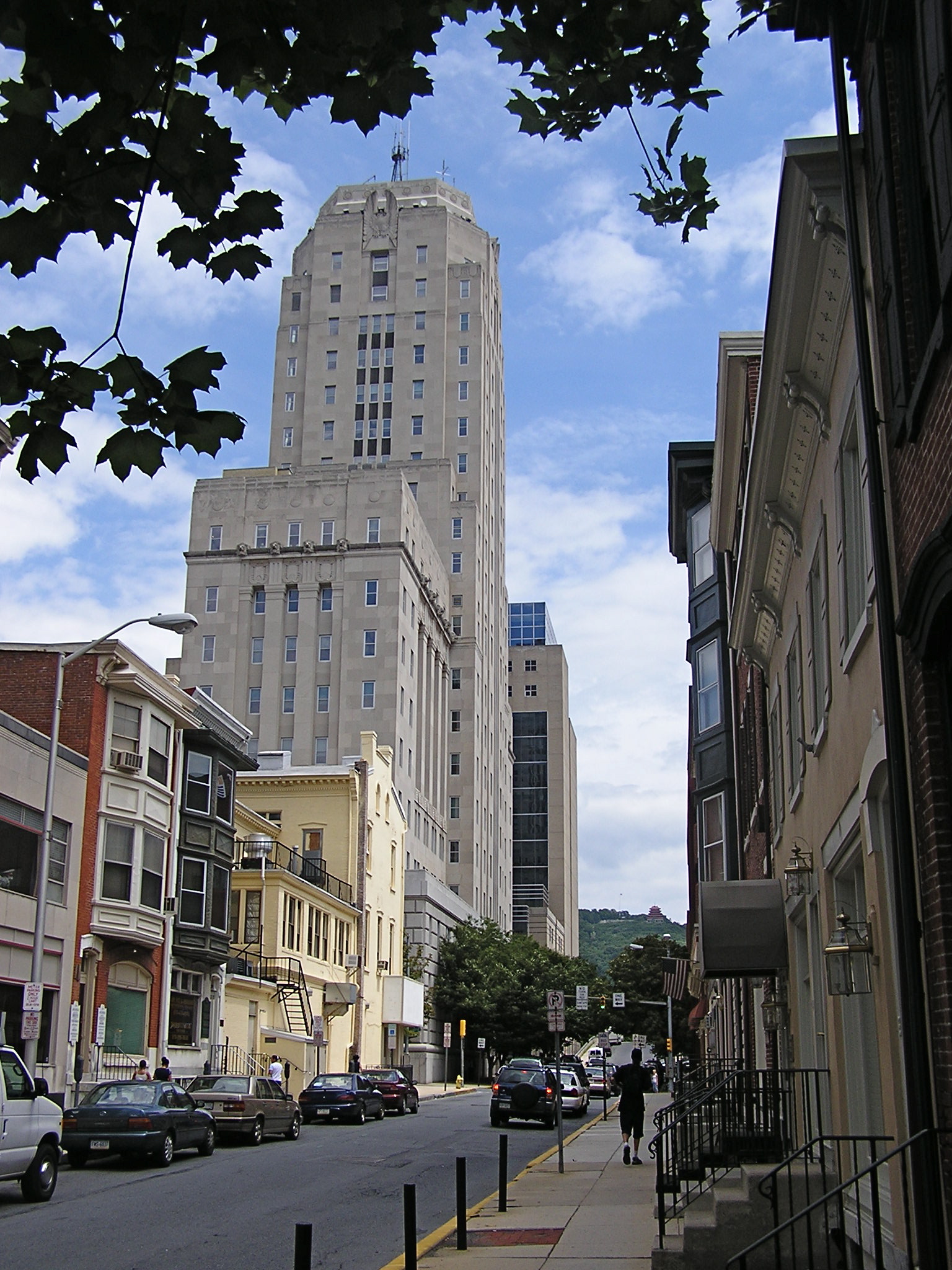|
James Wilson (founding Father)
James Wilson (September 14, 1742 – August 21, 1798) was a Scottish-born American Founding Father, legal scholar, jurist and statesman who served as an associate justice of the United States Supreme Court from 1789 to 1798. Wilson was elected twice to the Continental Congress, was a signatory of the Declaration of Independence, and was a major participant in drafting the U.S. Constitution. A leading legal theorist, he was one of the first four Associate Justices appointed to the Supreme Court by George Washington. In his capacity as the first professor of law at the College of Philadelphia (later to become the University of Pennsylvania), he taught the first course on the new Constitution to President Washington and his Cabinet in 1789 and 1790. Born near Leven, Fife, Scotland, Wilson emigrated to Philadelphia in 1766 and became a teacher at the College of Philadelphia. After studying law under John Dickinson, he was admitted to the bar and set up legal practice in Reading ... [...More Info...] [...Related Items...] OR: [Wikipedia] [Google] [Baidu] |
Associate Justice Of The Supreme Court Of The United States
An associate justice of the Supreme Court of the United States is any member of the Supreme Court of the United States other than the chief justice of the United States. The number of associate justices is eight, as set by the Judiciary Act of 1869. Article II, Section 2, Clause 2 of the Constitution of the United States grants plenary power to the president to nominate, and with the advice and consent (confirmation) of the Senate, appoint justices to the Supreme Court. Article III, Section 1 of the Constitution effectively grants life tenure to associate justices, and all other federal judges, which ends only when a justice dies, retires, resigns, or is removed from office by impeachment. Each Supreme Court justice has a single vote in deciding the cases argued before it, and the chief justice's vote counts no more than that of any other justice; however, the chief justice leads the discussion of the case among the justices. Furthermore, the chief justice—when in the ... [...More Info...] [...Related Items...] OR: [Wikipedia] [Google] [Baidu] |
University Of Pennsylvania
The University of Pennsylvania (also known as Penn or UPenn) is a private research university in Philadelphia. It is the fourth-oldest institution of higher education in the United States and is ranked among the highest-regarded universities by numerous organizations and scholars. While the university dates its founding to 1740, it was created by Benjamin Franklin and other Philadelphia citizens in 1749. It is a member of the Ivy League. The university has four undergraduate schools as well as twelve graduate and professional schools. Schools enrolling undergraduates include the College of Arts and Sciences, the School of Engineering and Applied Science, the Wharton School, and the School of Nursing. Among its highly ranked graduate schools are its law school, whose first professor wrote the first draft of the United States Constitution, its medical school, the first in North America, and Wharton, the first collegiate business school. Penn's endowment is US$20.7 billi ... [...More Info...] [...Related Items...] OR: [Wikipedia] [Google] [Baidu] |
Roger Sherman
Roger Sherman (April 19, 1721 – July 23, 1793) was an American statesman, lawyer, and a Founding Father of the United States. He is the only person to sign four of the great state papers of the United States related to the founding: the Continental Association, Declaration of Independence, Articles of Confederation, and U.S. Constitution. He also signed the 1774 Petition to the King. Born in Newton, Massachusetts, Sherman established a legal career in Litchfield County, Connecticut, despite a lack of formal education. After a period in the Connecticut House of Representatives, he served as a justice of the Superior Court of Connecticut from 1766 to 1789. He represented Connecticut at the Continental Congress, and he was a member of the Committee of Five that drafted the Declaration of Independence. Sherman served as a delegate to the 1787 Philadelphia Convention, which produced the United States Constitution. After Benjamin Franklin, he was the second oldest delegate p ... [...More Info...] [...Related Items...] OR: [Wikipedia] [Google] [Baidu] |
Participatory Democracy
Participatory democracy, participant democracy or participative democracy is a form of government in which citizens participate individually and directly in political decisions and policies that affect their lives, rather than through elected representatives. Elements of direct and representative democracy are combined in this model. Overview Participatory democracy is a type of democracy, which is itself a form of government. The term "democracy" is derived from the Greek expression (dēmokratia) ''(δῆμος/ dēmos'': people, ''Κράτος/ kratos'': rule). It has two main subtypes, direct and representative democracy. In the former, the people have the authority to deliberate and decide legislation; in the latter, they choose governing officials to do so. While direct democracy was the original concept, its representative version is the most widespread today. Public participation, in this context, is the inclusion of the public in the activities of a polity. It can ... [...More Info...] [...Related Items...] OR: [Wikipedia] [Google] [Baidu] |
Federal Government Of The United States
The federal government of the United States (U.S. federal government or U.S. government) is the national government of the United States, a federal republic located primarily in North America, composed of 50 states, a city within a federal district (the city of Washington in the District of Columbia, where most of the federal government is based), five major self-governing territories and several island possessions. The federal government, sometimes simply referred to as Washington, is composed of three distinct branches: legislative, executive, and judicial, whose powers are vested by the U.S. Constitution in the Congress, the president and the federal courts, respectively. The powers and duties of these branches are further defined by acts of Congress, including the creation of executive departments and courts inferior to the Supreme Court. Naming The full name of the republic is "United States of America". No other name appears in the Constitution, and th ... [...More Info...] [...Related Items...] OR: [Wikipedia] [Google] [Baidu] |
Committee Of Detail
The Committee of Detail was a committee established by the United States Constitutional Convention on July 24, 1787, to put down a draft text reflecting the agreements made by the convention up to that point, including the Virginia Plan's 15 resolutions. The convention adjourned from July 26 to August 6 to await their report. Much of what was contained in the final document was present in this draft. The committee was chaired by John Rutledge, with the other members including Edmund Randolph, Oliver Ellsworth, James Wilson, and Nathaniel Gorham. Although the membership of the committee disproportionately favored the larger states, it was fairly evenly balanced in terms of geographic distribution: Gorham (Massachusetts) representing northern New England, Ellsworth (Connecticut) representing lower New England, Wilson (Pennsylvania) representing the middle states, Randolph (Virginia) representing the upper South, and Rutledge (South Carolina) representing the lower South. Ove ... [...More Info...] [...Related Items...] OR: [Wikipedia] [Google] [Baidu] |
Constitutional Convention (United States)
The Constitutional Convention took place in Philadelphia from May 25 to September 17, 1787. Although the convention was intended to revise the league of states and first system of government under the Articles of Confederation, the intention from the outset of many of its proponents, chief among them James Madison of Virginia and Alexander Hamilton of New York, was to create a new Frame of Government rather than fix the existing one. The delegates elected George Washington of Virginia, former commanding general of the Continental Army in the late American Revolutionary War (1775–1783) and proponent of a stronger national government, to become President of the convention. The result of the convention was the creation of the Constitution of the United States, placing the Convention among the most significant events in American history. The convention took place in the old Pennsylvania State House (now known as Independence Hall) in Philadelphia. At the time, the conventio ... [...More Info...] [...Related Items...] OR: [Wikipedia] [Google] [Baidu] |
Illinois-Wabash Company
The Illinois-Wabash Company, formally known as the United Illinois and Wabash Land Company, was a company formed in {{start date and age, 1779, p=y from the merger of the Illinois Company and the Wabash Company. The two companies had been established in order to purchase land from Native Americans in the Illinois Country, a region of North America acquired by Great Britain in 1763. The Illinois Company purchased two large tracts of land in 1773; the Wabash Company purchased two additional tracts in 1775. Because the Royal Proclamation of 1763 forbade private purchase of Native American lands, Great Britain refused to recognize these transactions. Following the outbreak of the American Revolutionary War, officials of the merged Illinois-Wabash Company appealed to both Virginia (which claimed the Illinois Country) and to the United States to recognize their land purchases, but were unsuccessful. After the United States bought the land in question from Native Americans and resold ... [...More Info...] [...Related Items...] OR: [Wikipedia] [Google] [Baidu] |
Thirteen Colonies
The Thirteen Colonies, also known as the Thirteen British Colonies, the Thirteen American Colonies, or later as the United Colonies, were a group of British colonies on the Atlantic coast of North America. Founded in the 17th and 18th centuries, they began fighting the American Revolutionary War in April 1775 and formed the United States of America by declaring full independence in July 1776. Just prior to declaring independence, the Thirteen Colonies in their traditional groupings were: New England (New Hampshire; Massachusetts; Rhode Island; Connecticut); Middle (New York; New Jersey; Pennsylvania; Delaware); Southern (Maryland; Virginia; North Carolina; South Carolina; and Georgia). The Thirteen Colonies came to have very similar political, constitutional, and legal systems, dominated by Protestant English-speakers. The first of these colonies was Virginia Colony in 1607, a Southern colony. While all these colonies needed to become economically viable, the founding of ... [...More Info...] [...Related Items...] OR: [Wikipedia] [Google] [Baidu] |
Parliament Of Great Britain
The Parliament of Great Britain was formed in May 1707 following the ratification of the Acts of Union by both the Parliament of England and the Parliament of Scotland. The Acts ratified the treaty of Union which created a new unified Kingdom of Great Britain and created the parliament of Great Britain located in the former home of the English parliament in the Palace of Westminster, near the City of London. This lasted nearly a century, until the Acts of Union 1800 merged the separate British and Irish Parliaments into a single Parliament of the United Kingdom with effect from 1 January 1801. History Following the Treaty of Union in 1706, Acts of Union ratifying the Treaty were passed in both the Parliament of England and the Parliament of Scotland, which created a new Kingdom of Great Britain. The Acts paved the way for the enactment of the treaty of Union which created a new parliament, referred to as the 'Parliament of Great Britain', based in the home of the former ... [...More Info...] [...Related Items...] OR: [Wikipedia] [Google] [Baidu] |
Reading, Pennsylvania
Reading ( ; Pennsylvania Dutch: ''Reddin'') is a city in and the county seat of Berks County, Pennsylvania, United States. The city had a population of 95,112 as of the 2020 census and is the fourth-largest city in Pennsylvania after Philadelphia, Pittsburgh, and Allentown. Reading is located in the southeastern part of the state and is the principal city of the Greater Reading Area, which had 420,152 residents as of 2020. Reading is part of the Delaware Valley, also known as the Philadelphia metropolitan area, a region that also includes Philadelphia, Upper Darby Township, Pennsylvania, Camden, and other suburban Philadelphia cities and regions. With a 2020 population of 6,228,601, the Delaware Valley is the seventh largest metropolitan region in the nation. Reading's name was drawn from the now-defunct Reading Company, widely known as the Reading Railroad and since acquired by Conrail, that played a vital role in transporting anthracite coal from the Pennsylvania' ... [...More Info...] [...Related Items...] OR: [Wikipedia] [Google] [Baidu] |
John Dickinson
John Dickinson (November 13 /nowiki>Julian calendar November 2">Julian_calendar.html" ;"title="/nowiki>Julian calendar">/nowiki>Julian calendar November 2 1732Various sources indicate a birth date of November 8, 12 or 13, but his most recent biographer, Flower, offers November 2 without dispute. – February 14, 1808), a Founding Father of the United States, was an attorney and politician from Philadelphia, Philadelphia, Pennsylvania, and Wilmington, Delaware. Dickinson was known as the "Penman of the Revolution" for his twelve '' Letters from a Farmer in Pennsylvania'', published individually in 1767 and 1768, and he also wrote " The Liberty Song" in 1768. As a member of the First Continental Congress, where he signed the Continental Association, Dickinson drafted most of the 1774 Petition to the King, and then, as a member of the Second Continental Congress, he wrote the 1775 Olive Branch Petition. Both of these attempts to negotiate with King George III of Great Britain fai ... [...More Info...] [...Related Items...] OR: [Wikipedia] [Google] [Baidu] |



%2C_by_John_Trumbull.jpg)



